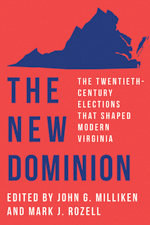Today, we are happy to bring you our conversation with John G. Milliken and Mark J. Rozell, editors of THE NEW DOMINION: The Twentieth-Century Elections That Shaped Modern Virginia:
What inspired you to edit this book?
Milliken: I grew up in the in the 1950s in a rural Virginia county in the far Virginia exurbs of Washington DC. My friends were the sons and daughters of farmers and local shopkeepers, all living in a strictly segregated community which believed in the “Lost Cause” and followed the politics of the late Harry Byrd Sr. The requirements of my father’s job led to finishing high school in Europe and undergraduate education at Haverford College. Two professors there nurtured my interest in Southern politics generally and I wrote my senior honors thesis on the 1966 election in Virginia. I returned to Virginia to attend law school and spent the next 45 years in a mix of politics, elected and appointed office, and law practice. Retirement and the pandemic led me to return to the topic of my thesis which became a chapter in the larger book which utilized the knowledge and expertise of my co-editor Dean Mark Rozell and the several authors whose own chapters are included.
Rozell: My long-standing interest in Virginia politics and the politics of the US South. I have been a devoted observer and analyst of Virginia politics for four decades, a frequent contributor of columns on Virginia politics to the Washington Post and the Richmond Times Dispatch, among others, and I am the co-author of an earlier book (1996) on the rise of the religious conservatism movement in Virginia politics (Johns Hopkins University Press). Most recently I am co-author of several volumes on the politics of the US South (all with Oxford University Press).
What did you learn and what are you hoping readers will learn from your book?
The broad goal of the book is to answer the question of what drove the profound change in the politics of Virginia from the segregationist bastion of Harry Byrd to today’s purple, trending blue, multicultural state. And its answer affirms the political maxim of “whoever decides who votes, decides who wins”. Virginia went from the tightly limited electorate of the Byrd era when the Organization’s choices could prevail in the Democratic primary, because of the restricted electorate, with the support of only 5-7 percent of the adult population in contrast to today’s politics which sets new records for voter participation nearly every year. The book identifies the two major drivers of that change as the rise in the participation of Black voters and the explosive population growth in northern Virginia coupled with population loss in many rural communities. Although much contemporary analysis takes a short-term perspective on what drove dramatic change in Virginia politics and government, the origins of such change were planted in the key 20th century elections documented in this book.
What surprised you the most in the process of editing the book?
How long it took. On the substance of the material, I think we knew it well and are not surprised. They key is that readers who have been told constantly in media coverage that all is new in Virginia, may be surprised by the extent and the depth of political change taking place in Virginia long before it started to trend blue in this century.
What’s your favorite anecdote from your book?
Milliken: As related in Evan Faulkenbury’s book Poll Power, Attorney General Robert Kennedy held a meeting with several members of the Freedom Ride Coordinating Committee in his office in June 1961. He sought to get them and their allies to suspend the Freedom Rides on interstate buses in the Deep South in order to prevent further violence. Instead, he argued, all of their efforts should be focused on registering new voters to bring about real change. The young leaders demurred and went on with their plans to push the issue of desegregating buses and bus terminals in the deep south. But out of that meeting came the idea of financially supporting voter registration throughout the South. Stephen Currier from Fauquier County, scion of a wealthy family, provided leadership through the Taconic Foundation that he and his wife Audrey (granddaughter of Andrew Mellon) had founded. Hundreds of thousands of dollars were raised from a variety of Foundations and projects registering thousands of new voters were supported across the South, including many in Virginia.
Rozell: Doug Wilders’ elections in 1985 and 1989 was the culmination of rising African-American voter power that had its antecedents in earlier Civil Rights activism and Black voter mobilization in the state. But as often happens with real and symbolic racial progress events, after his historical gubernatorial win in 1989, there was growing resistance to Black political advancement in Virginia that took years to begin to overcome.
What’s next?
Milliken is overseeing an Independent Studies course at George Mason University on 20th century Virginia history and plans to teach a course on the subject in the fall. He also is working on a paper about the Reverend John Paul Carter, whom he first learned of during his research for this book. An Episcopal minister, Carter was the key organizer of what was known as the Airlie Group, an alliance of Virginia progressives in the mid 1960’s, supporting candidates in opposition to the Byrd Organization. Rozell is working with three authors on a book on “what is the political South?” That is in addition to being dean of the Schar School!





